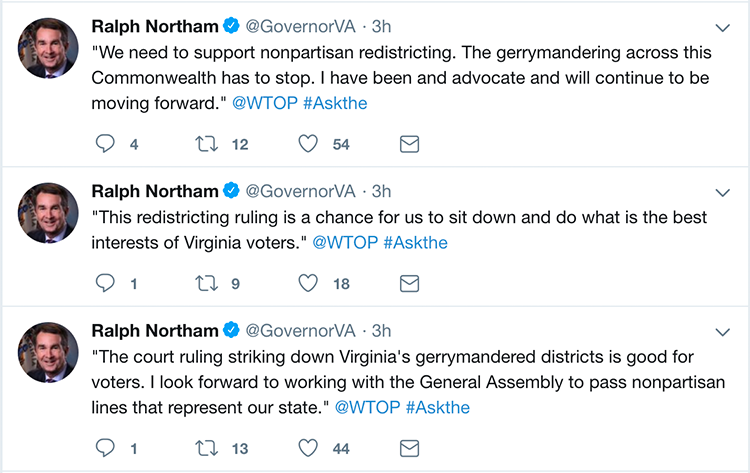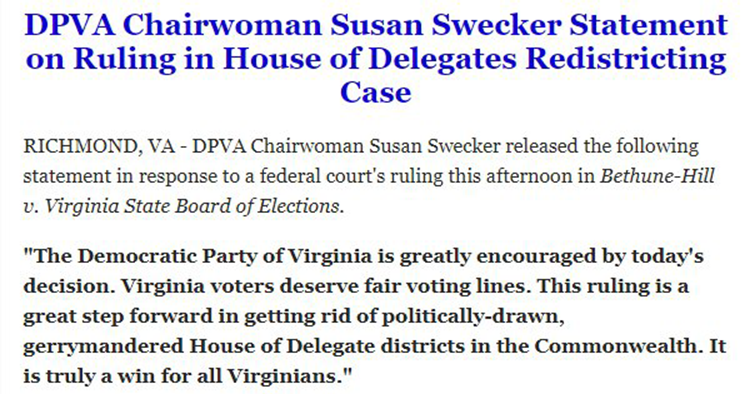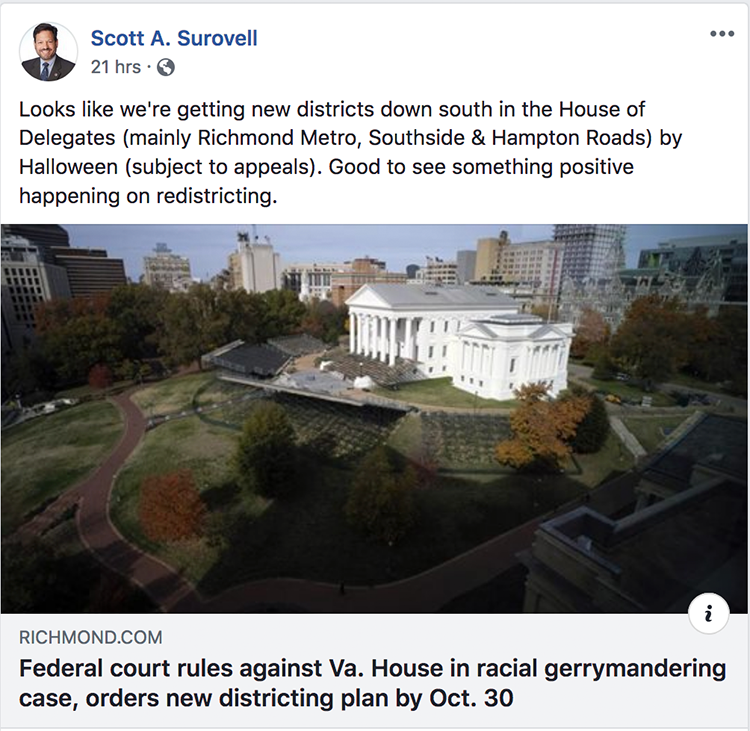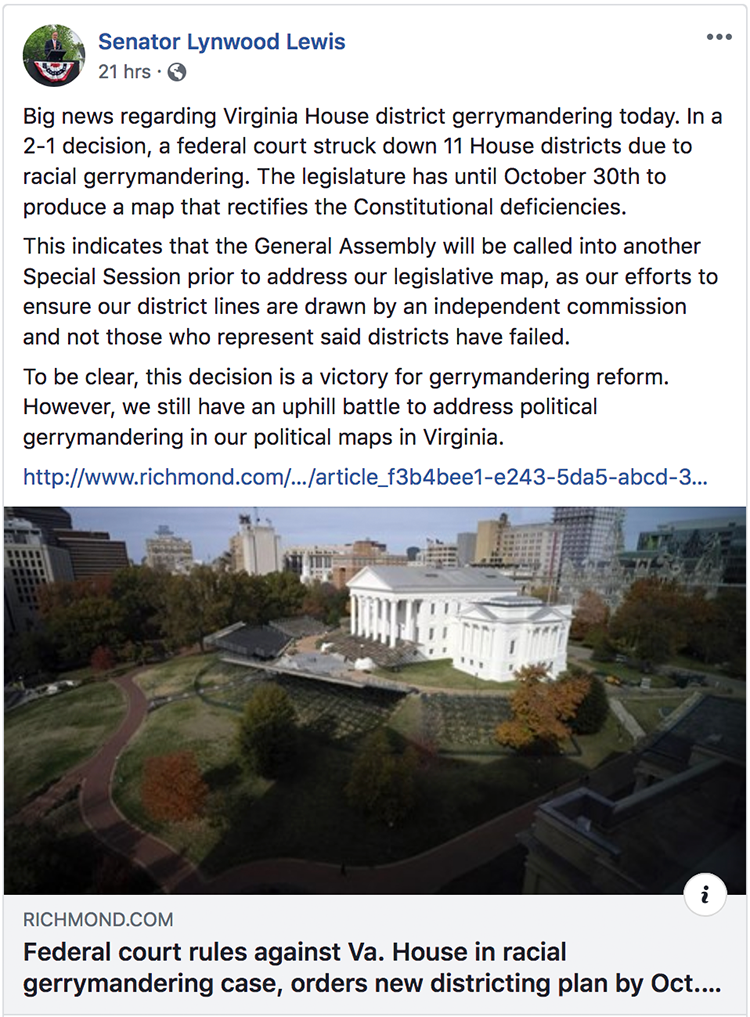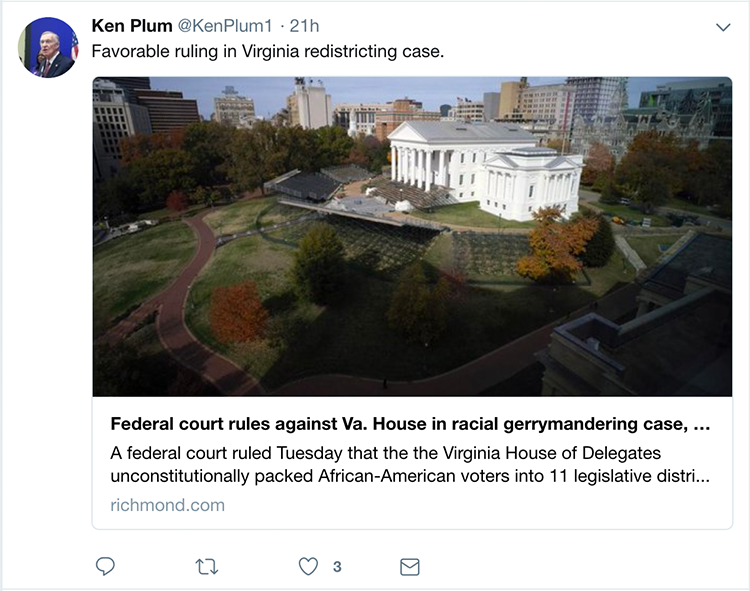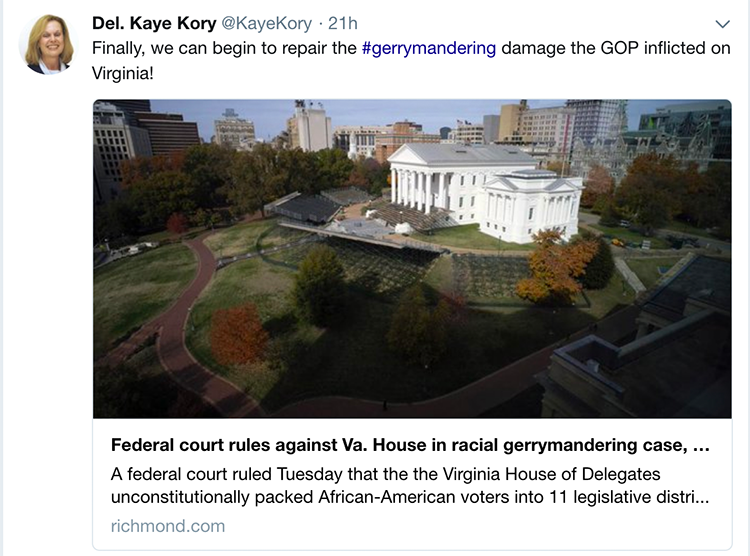Redistricting Ruling Brings out Rank Hypocrisy in VA House Democrats
Tuesday afternoon, a federal district court in Richmond tossed out 11 district boundaries in the Virginia House of Delegates, while ordering the General Assembly to redraw the lines by October 30th of 2018. Republican House Speaker Kirk Cox has already vowed to appeal.
Without skipping a beat, the Democratic Party of Virginia and senior Democratic leadership began playing partisan politics with the ruling, despite the fact that a 67% supermajority of House Democrats supported these maps when they were voted on in 2011.
This stunning flip-flop perfectly illustrates what Ed Gillespie meant when he said, “You can’t take the politics out of politics.”
The ruling in Bethune-Hill proves his point. Seven years ago, these maps passed the House of Delegates in a strongly-bipartisan 80-9 vote. The Senate then approved an amended plan by equally strong margins in a 32-5 vote, which notably included the support of then-Senator Ralph Northam. The Senate changes were ultimately accepted by the House in another strong, bipartisan vote of 63-7, which was marked by numerous abstentions from both parties.
Most of those abstentions were from Republicans, not Democrats.
At the time, House Democrats overwhelmingly supported the plan they are now denouncing and using as a partisan political football, complete with dishonest allegations of illegal racial gerrymandering which Democrats did not raise back when they supported the bipartisan plan.
Democratic Governor Ralph Northam led the charge, firing off three Tweets this morning:
Northam wasn’t always this partisan. In 2011, he joined 31 other Senators in supporting this plan. Now, he says, “The gerrymandering across this Commonwealth,” which he voted for, “has to stop.”
If he thought the 2011 maps were a partisan or racial gerrymander, why did he support them?
This is not Northam’s first flip-flop on election issues since becoming governor. In 2010, Northam supported HB527, a strongly-bipartisan reorganization of the State Board of Elections, which had extensive support from election professionals and passed the House 96-3 before becoming bogged down by personality politics in Senate committee. At the time, Northam was the lone Democrat willing to advance the bill on its merits.
This year, Northam issued veto threats against a substantially similar proposal, SB825, and even had the patron neuter the bill on his demand.
It appears that the big chair has brought out a new degree of partisanship in Northam, who once considered switching parties and joining Republicans in 2009. Northam voted for George W. Bush twice, and as the Richmond quip goes, the first Democrat he ever voted for was himself. It would seem partisanship has taken over.
The Democratic Party of Virginia also joined the chorus of hypocrisy, declaring in a statement:
In 2011, Democrats held 39 seats in the House of Delegates.
Of those 39, 26 Democrats, or 67% of the caucus, voted for the redistricting plan. 21 of them concurred in agreement with Senate Democrats, who also supported the plan by a large majority.
Now, DPVA has reversed course and is attacking the position which a supermajority of their House caucus supported.
The Democratic delegates who supported the plan are: Rosalyn Dance, David Englin, Ken Plum, James Scott, Luke Torian, Kenneth Alexander, Mamye BaCote, Bill Barlow, Robert Brink, David Bulova, Betsy Carr, Eileen Filler-Corn, Charniele Herring, Algie Howell, Matthew James, Johnny Joannou, Mark Keam, Lynwood Lewis, Jennifer McClellan, Delores McQuinn, Clarence Phillips, Mark Sickles, Lionell Spruill, Scott Surovell, Onzlee Ware, and Vivian Watts.
Only Democratic delegates Robin Abbott, Adam Ebbin, Patrick Hope, Paula Miller, Joe Morrissey, David Toscano, and Jeion Ward consistently voted against it.
Of those, only Ebbin, Hope, Toscano, and Ward still serve in the General Assembly, meaning that only four then-House Democrats who voted on these maps are free to criticize them without charges of hypocrisy.
How would a “politically-motivated” redistricting plan, as DPVA has alleged, earn the support from a supermajority of the House Democratic caucus?
This attack makes no sense and is at odds with history.
Several House Democratic legislators who cast a vote in support of that bipartisan redistricting plan chose to join in the hypocrisy.
One was Rosalyn Dance of Petersburg, who served in the House of Delegates in 2011 but now serves in the Senate. Shortly after the ruling, she Tweeted this:
In her Tweet, Dance echoes the phony accusation that the “Republican majority wrongly used race to set boundaries” without mentioning that she voted for those boundaries – twice.
If those boundaries were wrongfully racially driven, why did she support them?
Then-Delegate (now Senator) Scott Surovell also praised the news that the old districts had been thrown out, saying, “Good to see something positive happening on redistricting.”
In 2011, Surovell also voted to support the plan he is now happy to see thrown out – not once, but twice.
Another former House Democrat (now Senator) Lynwood Lewis also celebrated the news, which he said “rectifies the Constitutional deficiencies” in what he called “racial gerrymandering.”
Lewis also supported the 2011 plan when he served in the House of Delegates. That begs the question: if he thought the bipartisan map was Constitutionally deficient and racially based, why did he vote for it twice?
Senior Democratic Delegate Ken Plum wasn’t quite as celebratory, though he called the ruling “favorable.”
Plum also voted twice in support of the 2011 map. As a senior leader, he carries great respect within his caucus, so much so that he was under consideration for the Speakership when it appeared Democrats might control the lower chamber prior to the finalization of the contested races last year.
Delegate Kaye Kory of Falls Church sent out this Tweet, lamenting the “#gerrymandering damage” which she said “the GOP inflicted on Virginia!”
Kory wasn’t quite as strident in 2011, when she refused to vote against the maps, twice.
If she thought these maps truly inflicted “#gerrymandering damage,” why did she not push a button and vote them down?
Surely the voters of Falls Church expect a Delegate who would not “inflict” any “damage” on Virginia.
Reasonable politicians can agree to disagree on district boundaries in the redistricting process, which represent a vote on the politics of politics.
However, a number of Democrats have fully flip-flopped in the first 24 hours after the ruling, and we would expect that more will soon follow.
What’s not reasonable, though, is for a party to engineer a narrative about supposed Republican partisanship when a supermajority of House Democrats supported the bipartisan plan in 2011.
Nor is it reasonable to throw civility out the window and accuse the opposition party of illegal “racial gerrymandering.” If Democrats want to advance that narrative, they would first have to admit they had no problem with an illegal racial gerrymander in 2011.
So which is it?
Do the court-voided maps constitute an illegal racial gerrymander, which Democrats supported?
Were those maps “partisan” and “politically-drawn” as Northam and DPVA alleged, despite Northam’s vote in support?
Is this simply a case of Virginia Democrats trying to move the goalposts after-the-fact now that these maps are no longer politically convenient?
If Democrats are celebrating this ruling because they believe it will let them make a play for control of the House of Delegates next year, then perhaps they should look in the mirror and ask themselves if they are trying to pick their own voters at a moment of convenience.
Or, perhaps, the strongly bipartisan lines were drawn by necessity and according to geographic boundaries, in full compliance with the Voting Rights Act, back when Virginia was subject to pre-clearance through the Department of Justice.
If supposed “problems” weren’t raised by House Democrats back then, perhaps that’s because a supermajority of the Democratic caucus didn’t see any.


